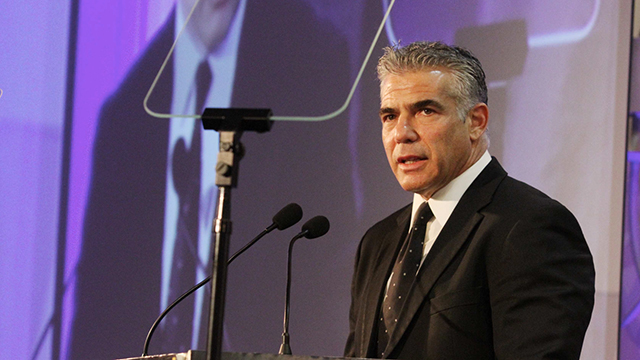
Lapid's numbers don't add up
Op-ed: Senior Treasury officials are unable to explain how the state intends to finance some NIS 4 billion in expenditures.
Every year, ministers, Knesset members, economists and the public at large struggle to grasp the ins-and-outs of the budget – to understand how much money has been allocated to each objective, the overall framework of the budget itself and, of course, how the planned deficit will be covered.
It emerged on Sunday that Finance Ministry officials, too, can't really say just how much the government plans to spend next year, or how it plans to finance some of the expenditures.
According to our calculations in Yedioth Ahronoth of the expenses and additions to the state budget, there appears to be NIS 4 billion, and maybe even NIS 5 billion, shortfall. And when we asked senior Finance Ministry officials – first and foremost, Minister Yair Lapid, Director General Yael Andorn and Budgets Department Director Amir Levy – to explain the numbers presented at the press conference, they promised answers "within two or three days."
We can conclude therefore that in actual fact, when the frameworks of the state budget were eventually finalized during the decisive talks Prime Minister Benjamin Netanyahu convened on the eve of Rosh Hashanah with senior treasury and Defense Ministry officials and his economic advisors, they failed to do the simple math of how and from where the overdraft will be covered.
"It was the eve of the holiday and we didn't work on the holiday itself," the senior treasury officials explained after the press conference. "Everything will be worked out over the next two or three days and become clearer to everyone."
Related stories:
- Lapid presents budget for 2015: More funds for army, education, health
- Netanyahu: Heavy investment in defense saved Israeli economy
- Finance C'tee okays NIS 3.9 billion addition to defense budget
The senior treasury officials also improvised when it came to the sources of funding for the NIS 4 billion overdraft in the government's budget for expenditures – NIS 1 billion will come from the monies of the Jewish National Fund, "which should finally be subjected to the Budget Fundamentals Law;" NIS 1 billion will come from the issuing of Israel Railways government bonds; and another NIS 2 billion will come from a budget cut that has already been agreed. Perhaps, the officials hinted, there may be need for an additional across-the-board cut in the ministerial budgets.
And another solution: More money will be exacted from the state's natural resources, and the fight against black market capital will also bear fruit – a promise made over and over again during the various tax-collection campaigns in the past four years, with paltry results in terms of the sums retrieved.
Despite the problems, Finance Minister Lapid oozed confidence on Sunday: "If the previous budget was a crisis budget, the present budget is a budget of hope and promise," he said. "Two years ago, I said, 'We've come to make a change.' This change is now taking place."
The state budget, Lapid added, "is the tool we have to give our children a better education and opportunities we didn't have, to give our parents medical care and the chance to grow old with dignity, to give ourselves more jobs, more engines of growth. We are talking about responsible management of the Israeli economic ship and the creation of strong engines of growth that will enable us to continue to be a world leader in innovation and creativity."
The finance minister said the budget spelled good news from a social perspective and would lead to "a series of reforms and programs to better the conditions of the citizens of Israel."
Meanwhile, reactions to the press conference on the budget came thick and fast.
According to Shelly Yachimovich (Labor), "Lapid is knowingly deceiving the public when he speaks about channeling budgets to the social ministries. In practice, he's implementing a sharp cut that is tantamount to raising taxes and will require the public to pay more for education and health. Lapid is exploiting the public's lack of familiarity with the budget regulations and is publishing numbers that are far removed from reality. The press conference was a stage for unfounded figures about growth, and the entire budget is one of recession and further inequality."
Meretz leader MK Zahava Gal-On said Lapid's declarations heralded nothing new at all. "The reinstatement of most of the addition to the Defense Ministry budget, along with the decision not to abolish corrupt tax exemptions and not to raise taxes on the rich, promise one thing only – the song remains the same," Gal-On said. "The social services will continue to crumble and the insiders will continue to make hay. It's impossible. The numbers simply don't add up. Either they need to make cuts, or they need to raise taxes, or they need to overstep the deficit."
MK Itzik Shmuli (Labor) added: "Calling the budget a social budget is a joke – and it's a shame that it's at our expense. The budget doesn't include a single engine of growth and no investment in narrowing social gaps, which have become frightening here in Israel. We intend to wage a war of destruction against this awful budget."
Knesset Finance Committee Chairman MK Nissan Slomiansky (Bayit Yehudi) welcomed the end of the "saga between the finance minister and prime minister," but added: "There still remains the big mystery of where they are going to get all that money the finance minister spoke of.
"I will invite the finance minister to the Finance Committee to explain where the money will come from. The upcoming budget isn't perfect. It lacks growth engines and represents a 3.4 percent deficit, which I am not comfortable with."
Gad Lior is chief of Yedioth Ahronoth's Jerusalem Bureau.











